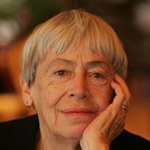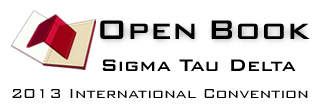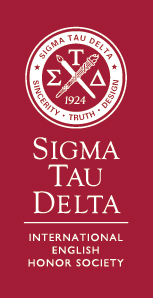 |
Ursula K. Le GuinThursday, March 21, 2:30 p.m. |
We are honored and thrilled that Ursula K. Le Guin will be speaking at the 2013 Sigma Tau Delta Convention in Portland, Oregon. Few American writers have done work of such high quality in so many forms. Le Guin writes both poetry and prose, and in various modes including realistic fiction, science fiction, fantasy, children's books, books for young adults, screenplays, essays, verbal texts for musicians, and voicetexts. She has published seven books of poetry, twenty-two novels, over a hundred short stories (collected in eleven volumes), four collections of essays, twelve books for children, and four volumes of translation.
In her writing, Le Guin thoughtfully and insightfully examines important social, ethical, and moral issues. Some of the most well known of Le Guin's works include the Hainish novels, the Earthsea trilogy, The Left Hand of Darkness, The Lathe of Heaven
, The Dispossessed
, The Word for World is Forest
, The Language of the Night, Dancing at the Edge of the World
, the Catwings series, and numerous poems, essays, and short stories. Le Guin's newest work is a collection of poems, Finding My Elegy
(September 2012).
Three of Le Guin's books have been finalists for the American Book Award and the Pulitzer Prize, and among the more than fifty five awards her writing has received are a National Book Award, five Hugo Awards, five Nebula Awards, SFWA's Grand Master, the Kafka Award, a Pushcart Prize, a Newberry Silver Medal, the Howard Vursell Award of the American Academy of Arts and Letters, the L.A. Times Robert Kirsch Award, the PEN/Malamud Award, the Margaret A. Edwards Award, etc. Le Guin's work has been translated into more than twenty five languages, and many of her works have been made into films.
Excerpt from Ursula K. Le Guin's introduction to The Left Hand of Darkness
Predictions are uttered by prophets (free of charge), by clairvoyants (who usually charge a fee, and are therefore more honored in their day than prophets), and by futurologists (salaried). Prediction is the business of prophets, clairvoyants, and futurologists. It is not the business of novelists. A novelist's business is lying. . . .
Fiction writers, at least in their braver moments, do desire the truth: to know it, speak it, serve it. But they go about it in a peculiar and devious way, which consists in inventing persons, places, and events which never did and never will exist or occur, and tell about these fictions in detail and at length and with a great deal of emotion, and when they say they are done writing down this pack of lies they say, There! That's the truth!
They may use all kinds of facts to support their tissue of lies. They may describe the Marshalsea Prison, which was a real place, or the battle of Borodino, which really was fought, or the process of cloning, which really takes place in laboratories, or the deterioration of a personality, which is described in real textbooks of psychology, and so on. This weight of verifiable place-event-phenomenon-behavior makes the reader forget that he is reading a pure invention, a history that never took place anywhere but in that unlocalizable region, the author's mind. In fact, while we read a novel, we are insane—bonkers. We believe in the existence of people who aren't there, we hear their voices, we watch the battle of Borodino with them, we may even become Napoleon. Sanity returns (in most cases) when the book is closed . . . .
The only truth I can understand or express is, logically defined, a lie. Psychologically defined, a symbol. Aesthetically defined, a metaphor . . . .
This book is not about the future. Yes, it begins by announcing that it's sent in the 'Ekumenical Year 1490-97,' but surely you don't believe that? Yes, the people in it are androgynous, but that doesn't mean that I'm predicting that in a millennium or so we will all be androgynous, or announcing that I think we damned well ought to be androgynous. I'm merely observing, in the peculiar, devious, and thought-experimental manner proper to science fiction, that if you look at us at certain odd times of day in certain weathers, we already are. I am not predicting, or prescribing. I am describing. I am describing certain aspects of psychological reality in the novelist's way, which is by inventing elaborate circumstantial lies.
In reading a novel, any novel, we have to know perfectly well that the whole thing is nonsense, and then, while reading, believe every word of it. Finally, when we're done with it, we may find—if it's a good novel—that we're a bit different from what we were before we read it, that we have been changed a little as if by having met a new face, crossed a street we never crossed before. But it's very hard to say just what we learned, how we were changed.
The artist deals with what cannot be said in words. The artist whose medium is fiction does this in words. The novelist says in words what cannot be said in words. Words can be used thus paradoxically because they have, along with a semiotic usage, a symbolic or metaphoric usage. (They also have a sound—a fact the linguistic positives take no interest in. A sentence or paragraph is like a chord or harmonic sequence in music: its meaning may be more clearly understood by the attentive ear, even though it is read in silence, than by the attentive intellect.)
All fiction is metaphor. Science fiction is metaphor. What sets it apart from older forms of fiction seems to be its use of new metaphors drawn from certain great dominants [domains?] of our contemporary life—science, all the sciences, and technology, and the relativistic and the historical outlook, among them. Space travel is one of these metaphors; so is an alternative society, an alternative biology; the future is another. The future, in fiction, is a metaphor.



